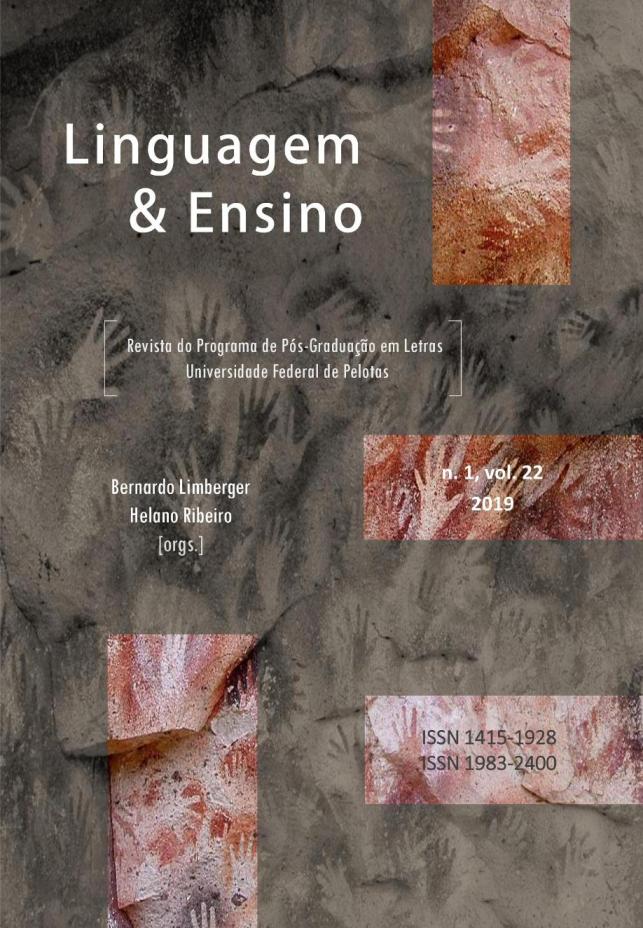Perguntas argumentativas em um material didático de ensino de língua inglesa: promovendo a mobilidade internacional dos estudantes
Resumo
Este trabalho tem como objetivo analisar e categorizar as questões de um material didático de uma disciplina de língua inglesa (RICHTER, 2015), de acordo com as categorias criadas por Ninin (2013). O material foi desenvolvido para a disciplina “Inglês na área de Ciências de Computação” em uma universidade federal do nordeste do Brasil. Neste projeto, discutimos como as perguntas usadas no material oferecem aos alunos oportunidades de se tornarem profissionais que agem de forma argumentativa e revisam seus próprios pontos de vista na pesquisa que desenvolveram durante o curso e fora da sala de aula. O material, desenvolvido pela pesquisadora, tem como foco a participação de estudantes em eventos acadêmicos internacionais. Fundamentado na Teoria da Atividade Sócio-Histórico-Cultural (TASHC) (VYGOTSKY, 1934/2007; LEONTIEV, 1977/1997; ENGESTRÖM, 1987/1999), este artigo baseia-se na Pesquisa Crítico-Colaborativa (PCCol) e é fundamentalmente enraizado na Linguística Aplicada (LA) por este ser um estudo da linguagem no âmbito acadêmico que promove mudanças nos papéis sociais. As questões utilizadas no material didático (RICHTER, 2015) foram analisadas segundo categorias como: forma, tipo, natureza, condução temática e estrutura (NININ, 2013). Três versões do mesmo resumo escrito por alunos também foram examinadas para verificar como as questões do material didático impactaram na escrita dos alunos. A análise dos dados sugeriu que a pergunta, quando bem elaborada, pode contribuir para a argumentação, para a exposição de pontos de vista, bem como para a expansão dialógica do conhecimento na escrita dos alunos. Além disso, a escolha de perguntas pode encorajar os alunos a participar da organização dialética do texto. (NININ, 2013).Referências
BAKHTIN, M. Questões de Literatura e Estética: a teoria do romance. 5. ed. São Paulo: Hucitec, 2002.
BAKHTIN, M. (VOLOSHINOV). Marxismo e Filosofia da Linguagem. São Paulo: Hucitec, 2004.
DAVYDOV, V. The Content and unsolved problems of Activity Theory. In: ENGESTRÖM, Y.; MIETTINEN, R.; PUNAMÄKI, R. (Eds, Perspectives on Activity Theory. Cambridge: Cambridge University Press, 1999, p. 39-52. https://doi.org/10.1017/CBO9780511812774.004
ENGESTRÖM, Y. Perspectives on Activity Theory. Cambridge: Cambridge University Press, 1999. https://doi.org/10.1017/CBO9780511812774
LARRÉ, J. Inglês nas diversas áreas da universidade: uma possibilidade baseada na argumentação a partir da produção de documentários. Curitiba: Appris, 2019.
LARRÉ, J. Uma trama a várias mãos: a escrita colaborativa na sala de aula de língua inglesa. (Unpublished master’s thesis). 2010. Programa de Pós-graduação em Letras (PPGL), UFRPE, Recife. 195 p. Access: 01 jan. 2018. Available in: https://bit.ly/2V5oMEk
LEONTIEV, A. Activity and Consciousness. In: KONSTANTINOV, F. V. Philosophy in the USSR, Problems of Dialectical Materialism (Moscow, 1977, p. 180-202). Available in: Marxists Internet Archive <http://www.marxists.org>. Access: March 07, 2019.
MARX, K.; ENGELS, F. (1945). A ideologia alemã. São Paulo: Centauro, 2011.
FERREIRA, M. Contribuições da teoria sócio-histórico-cultural e da atividade para o ensino-aprendizagem da língua estrangeira. In: LIBERALI, F.; MATEUS, E.; DAMIANOVIC, M. C. (orgs.) A Teoria da Atividade Social Recriando Realidades Sociais. Campinas: Editora Pontes, 2012, p. 61-89.
LEITÃO, S. O lugar da argumentação na construção do conhecimento em sala de aula. In: LEITÃO, S.; DAMIANOVIC, M. (orgs.) Argumentação na escola: O conhecimento em construção. Campinas, SP: Pontes Editores, 2011, p. 13-47.
LIBERALI, F. Argumentation: Tool and object in teacher education. In: MEDRADO, B.; REICHMANN, C. Projetos e práticas na formação de professores de língua inglesa. João Pessoa: 2012, p. 191-227.
RICHTER, C. Resumos científicos e Apresentação de Pôster em Congresso Internacional: Inglês Acadêmico Além-fronteiras na UFPE. In: Anais do I Seminário Nacional LIGUE: Linguagem, Línguas, Escola e Ensino II Seminário Nacional LAELI: Linguística Aplicada e o Educador De Língua Inglesa Aprender na Atividade Argumentativa Escola- Comunidade-Universidade, Recife, 2012a, p. 12-13.
RICHTER, C. O ensino da língua inglesa para fins específicos na universidade: a formação do discente - pesquisador. Oral communication presented in II Seminário Internacional de Línguas para Fins Específicos. LINFE. FATEC. São Paulo, 2012b.
RICHTER, C. A linguística aplicada e a TASHC: A performance discente na aula de língua estrangeira na universidade. Seminar presented in II Pocket Symposium: Linguística Aplicada e Análise e Discussão de Dados. UFPE, Recife, 2012 c.
ROJO, R. & MOURA, E. Multiletramentos na escola. São Paulo: Parábola, 2012.
LIBERALI, F. Argumentação em contexto escolar. São Paulo: Pontes, 2013.
MAGALHÃES, M. A linguagem na formação de professores como profissionais reflexivos e críticos. In: MAGALHÃES, M. (Org). A formação do professor como profissional crítico. Campinas, SP: Mercado das Letras, 2009, p. 45-63.
MATEUS, E. In: LIBERALI, F. Argumentação em contexto escolar. São Paulo: Pontes, 2013.
NININ, M. O. G. Da pergunta como ato monológico avaliativo à pergunta como espaço para expansão dialógica: uma investigação à luz da Linguística Aplicada sobre modos de perguntar. São Carlos: Pedro e João, 2013.
SANNINO, A.; DANIELS, H.; GUTIERREZ, K. Activity theory between historical engagement and future-making practice. In: SANNINO, A.; DANIELS, H.; GUTIERREZ, K. Learning and Expanding with Activity Theory. New York: CUP, 2009. p. 1-19. https://doi.org/10.1017/CBO9780511809989




1.png)
